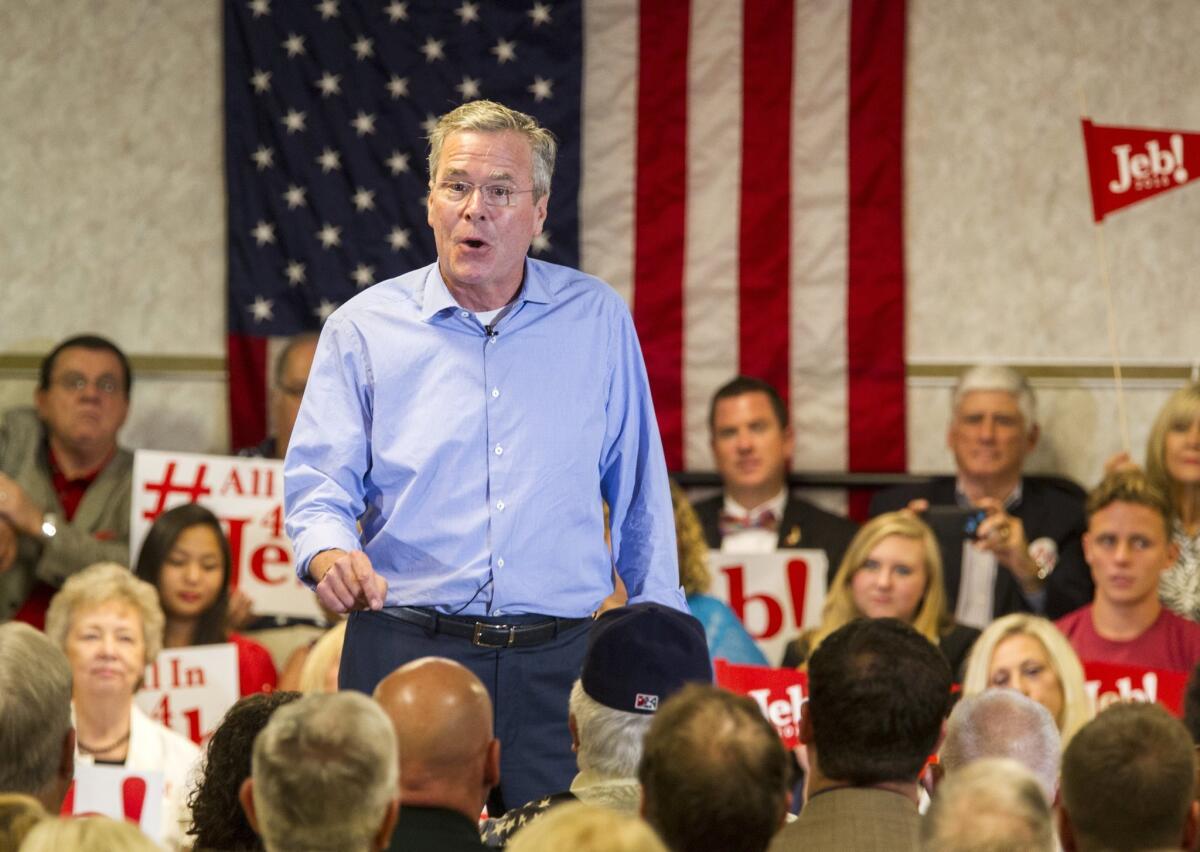The many definitions of âanchor babyâ

Republican presidential candidate Jeb Bush caused a stir when he stood by his use of the term âanchor babies.â
When former Florida Gov. Jeb Bush linked Asian Americans to the term "anchor babies" on Monday, saying they commit fraud in order to "take advantage of a noble concept, which is birthright citizenship," he received heaps of criticism.
Asian American lawmakers are demanding an apology from the presidential hopeful, who has joined other GOP candidates including Donald Trump and Louisiana Gov. Bobby Jindal who say they have no problem using the term.
In the end, the term "anchor baby" hinges on the 14th Amendment, which says people born in the U.S. are automatically American citizens, regardless of their parents' immigration status.
But comments like Bush's prove the term has multiple definitions. Here are a few:
Child of parents who are in the U.S. illegally
This definition carries the implication that the mother chose to give birth in the U.S. hoping that her baby's automatic citizenship will help her or other relatives secure legal immigration status.
The term, which the American Heritage Dictionary describes as offensive, is often applied to children of Latinos.
"The phrase is used to describe a phenomenon that is probably not even real," Times columnist Robin Abcarian argued Friday, adding that these children must be 21 years old before they can petition for their parents to enter the U.S.
Donald Trump disagrees. His immigration platform calls for the end of birthright citizenship, saying it "remains the biggest magnet" for illegal immigration.
"A woman's getting ready to have a baby," Trump said at a news conference Tuesday. "She crosses the border for one day, has the baby. All of a sudden, for the next 80 years â we have to take care of" that child.
Child born in the U.S. as part of 'maternity tourism'
Some pregnant women travel to the United States, usually on tourist visas, specifically so that their children will be born U.S. citizens. In Southern California, they often live with other pregnant women in suburban homes.
This practice, known as maternity tourism, has become particularly popular in recent years among newly wealthy women from China's middle class. Efforts to outlaw or regulate the practice has been unsuccessful.
In his Monday comments about Asian "anchor babies," Bush did not directly mention maternity tourism.
Child of noncitizen parents who legally live in the U.S.
Jindal doesn't consider himself an "anchor baby," but he often finds himself on the receiving end of the term.
The Republican governor's parents moved to the U.S. in 1971 after his mother received a scholarship to complete a graduate degree at Louisiana State University, according to the New Orleans Times-Picayune. When his parents arrived, his mother was already pregnant. His parents each had a green card at the time.
The idea that he is an "anchor baby" is "all silly," Jindal said, according to the Des Moines Register. "It's a distraction from the left, and they need to grow up and talk about the real issues."
Ordinary American citizen
Many people have pushed back against the term "anchor babies," cheekily suggesting that politicians should instead just say "babies" or "U.S. citizens."
One of the most personal of such critiques came Wednesday from Rep. Ted Lieu, a Torrance Democrat whose parents brought him to the United States from Taiwan when he was 3.
"My parents immigrated to the United States to achieve the American dream," Lieu said. "My parents went from being poor to owning a thriving small business. Their journey of hard work, sacrifice, success and contribution is as central to the American story as any other."
Times staff writers Shelby Grad and Noah Bierman contributed to this report.
For more local and breaking news, follow @sarahparvini on Twitter
READ MORE
How Donald Trump turned the immigration debate from reform to 'anchor babies'
Column: 'Anchor baby' is a slur against Mexicans, and Donald Trump should knock it off
Student starts #MyAsianAmericanStory in response to Jeb Bush's 'anchor baby' remarks
Sign up for Essential California
The most important California stories and recommendations in your inbox every morning.
You may occasionally receive promotional content from the Los Angeles Times.








